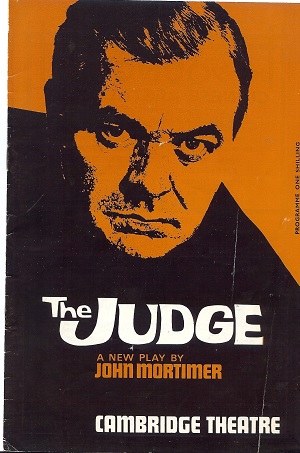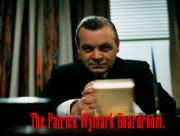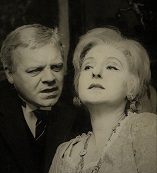

1 March 1967 The Judge (Stage Play) (for the TV play see below)

"Now a lot of bloody nonsense has been written about Judge Jeffreys. In fact he was a charming companion, an able lawyer, although he overstepped the mark on sentence." The Judge.
John Mortimer's stage play gave theatre audiences their first chance to see Patrick Wymark live since 1965's Left Handed Liberty. Following a tryout at the Theatre Royal, Brighton from 14 February 1967, producer Michael Codron brought the play to the West Ends Cambridge Theatre from the 1st of March 1967.
Mortimer would later create TV's cynical barrister, Rumpole of the Bailey, but The Judge was far more challenging than the loveable iconoclast played by Leo McKern. At first the plot seems like a variation on Friedrich Durrenmatt's The Visit , before veering off in a totally different direction . The Judge returns to his home city for the first time in 40 years to preside over the Assize ( periodic courts held across England and Wales, prior to the establishment of permanent Crown courts in 1972). The outward reason is because this is his last Assize before his retirement, but his personal mission is to atone for his own wrongs.

Patience Collier was granted leave of absence from the Royal Shakespeare Company to play Serena, a charming woman who runs an antique shop in the Cathedral Square. She is dubbed Aunt Serena by the local worthies who take part in ambiguous parties at the shop after closing time. Several young women attend the parties and the Judge believes Serena is running a brothel. The Judge believes that he corrupted Serena in their youth. The Judge wants to be judged and punished, but the play questions his perception. Serena may not have been so innocent, and his memories may be masking a deeper, more personal guilt.
The Judge dines with old schoolmates Dr Waggon (Richard Warner) and Dickon (Alan Foss), described by Heather as, "a Doctor who jumps two feet at the beat of his own heart and a foolish writer drunk on his own split-infinitives". We learn that the Judge's father was an organist at the Cathedral who amused himself by weaving popular songs into the hymns. Serena, the daughter of the Canon, was the object of schoolboy obsession for the Judge and his fellow students. One Christmas evening, a friend called Bluey took them to Serena's house while her parents were away. They played childish games, and then, "a game she had to teach us, if I remember."
The Judge believes that the kissing game led to his ruination of Serena, for which he must be judged. But first he must persuade Waggon and Dickon to expose Serena. He harks back to a more traditional Constable who provoked a whole village to take action against an obscenity merchant by smashing all their greenhouses and blaming the man. "You have to go to some lengths to remind people of their public duty". Dickon creates a scandal around one of the girls who attended Serena's parties and generates mob violence.
Writing in The Times, Irving Wardle described Wymark's Judge as, "a vicious, egotistical legislator, happiest when he is sniffing out crimes of lust and violence." Wardle believed that by, "playing the Judge on a consistent note of harsh, unforgiving self-flagellation, (he) becomes in the end rather ridiculous because his sense of morality and doom has no credible sense of proportion."
The Judge confronts Serena, urging her to denounce him, but learns some unsettling facts. Serena had run away, first to London and the Fitzroy Tavern* where she met a man who took her to Paris. The Judge apparently found her in Paris, abandoned by her lover, and brought her back to their home town. But she has found this the true exile, confined in a dull, conformist community with only her memories of a more colourful life.
(In the 1930's, the Fitzroy Tavern in Charlotte Street was known as a meeting place for artists and intellectuals "the closest thing in London to the Parisian cafes".)

Ernest Clark was yet to play his best-known role as Professor Loftus in the Doctor in the House TV series but had played a barrister opposing Wymark in the 1962 Scales of Justice film A Woman's Privilege. Clark appeared as Major Heather, the easy-going Chief Constable who believes there is no serious crime in his city due to his tolerant and progressive policies ("I honestly believe that in this town we're doing our best to struggle into the second half of the twentieth century. I feel we're ready to forgive each other almost anything.") Michael Pennington (who would appear with Wymark in the Nicol Williamson Hamlet ) made an early impression as Trapp, an ambitious young barrister who serves as the Judge's Marshal. Jacqueline Pearce (Hammer's The Reptile) played her first major theatre role as Pat Dean, an unsophisticated young woman seeking refuge with Serena after her father throws her out. Pat is one of many young girls who take part in the outwardly childish party games at Serena's antique shop. The Judge sends Trapp to investigate Serena but the young barrister succumbs to the temptations of Pat Dean, and the game which provides a clue to the Judge's 30-year-old misunderstanding.
One notable coincidence is that Serena's original deception of the Judge is similar to an incident in the life of poisoner William Palmer, who Wymark played in They Hanged My Saintly Billy .
Director Stuart Burge had also directed the stage production of "Public and Confidential" which was also adapted to TV for this Playhouse series. Burge had been associated with Producer Michael Codron since directing John Mortimer's first two one-act plays, Dock Brief and What Shall We tell Caroline? at the Garrick Theatre in 1955. He worked in film, TV and the stage, directing Robert Morley and Joan Plowright in Hook, Line and Sinker both in the West End and in a 1959 TV adaptation. Burge directed Patrick McGoohan in the "Dangerous Secret" episode of Danger Man , and would go on to direct the Alan Bennett, "Talking Heads" TV monologues for the BBC.
Sadly, the play only ran for two months with its final performance on Saturday 6 May 1967."People have been coming and enjoying it, but they haven't come in large enough numbers, " Patrick Wymark explained, "You see, it's a very expensive production."
12 March 1968 THE JUDGE (TV play)
The second of four Playhouse episodes starring Patrick Wymark, The Judge was adapted by John Mortimer from his stage play and directed by Dennis Vance, who had previously worked on The Plane Makers, and had also directed Wymark in I Remember the Battle (1965).
The TV play opened up the original with location filming in Lincoln. With the Law Courts being located inside Lincoln Castle, directly opposite the Cathedral, with Cathedral Square between them, this was a compact setting for the action.
In the TV production, the Judge is named as Mr Justice Chard (a name that was alluded to in a throwaway line in the stage production). As his train arrives at the station, the Judge evades the Chief Constable, Major Heather (played here by Anthony Marlowe, who had played Sir Frank Bennington in The Plane Makers episode In The Book ). In the TV production, Trapp is played by Terry Scully (Survivors) while Georgina Hale takes on the role of Pat Dean, and Michael Ripper plays Dickon, the journalist. Patience Collier recreated the role of Serena, and Charles Leno, played the Judge's Clerk both on stage and TV (Leno had previously played the Clerk in the long-running Michael Denison TV series Boyd QC).
After watching the play on TV, Patrick Wymark reportedly attended a reception at 10 Downing Street for the Prime Minister of Luxembourg, and talked with Harold Wilson about the Rhodesian situation